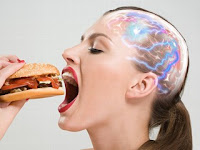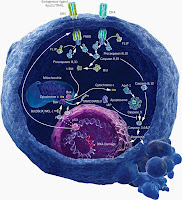I’ve been getting harangued for weeks by a severely wounded ego-centric proponent of the I’m-so-desperate-to-be-right approach to intellectual discourse, that I am finally giving in and providing some support for my thoughts on obesity. The blog stalker has insisted that I prove the validity of my thoughts on obesity, and so I will provide some evidence, but let it be known that this is the last response I will make to the ramblings.
In the most recent issue of the International Journal of Obesity [Volume 35, Issue 10 (October 2011)], no less than every article supports my position:
- On the causes of obesity:
Overweight and obesity are the results of an enduring positive energy balance, that is, when energy intake is larger than energy expenditure. Hence, overweight and obesity prevention requires effective intervention programmes targeting behaviours that contribute to both sides of this energy balance. These so-called energy balance-related behaviours include dietary behaviours (for example, consumption of fruit and vegetables, or sugar-sweetened beverages), sedentary behaviours (for example, television (TV) viewing or computer use) and physical activity behaviours (for example, sports or active commuting to school).
Interesting, calories in vs. calories out (boldface emphasis mine), and not one thing about hormones or genetics. That’s because it’s science, stupid.
- On parents needing to get involved because increased physical activity (PA) at school only is met with greater inactivity outside of school:
The PA of children seems to compensate in such a way that more activity at one time is met with less activity at another. The failure of PA programmes to reduce childhood obesity could be attributable to this compensation.
Duh! Parents are responsible for their children especially when they see them blowing up.
- That feeding your child crap disrupts their physiology to such a degree as to promote obesity:
Lower insulin sensitivity at childhood may predict subsequent total and central adiposity gain at adolescence. These findings enhance the role of insulin sensitivity as a target of obesity prevention already from the first decades of life.
Or in other words, don’t let your children eat junk food.
Children whose both parents were overweight or obese both before pregnancy and after 16-year follow-up had a strikingly high risk of overweight at age 16 years…parents’ long-term overweight (BMI
25 kg m−2 before pregnancy and after 16-year follow-up) was the strongest single predictor.
I almost can’t believe that anyone would need proof of this.
Consuming the recommended daily amount of water for children could result in an energy expenditure equivalent to an additional weight loss of about 1.2 kg per year…water drinking could assist overweight children in weight loss or maintenance, and may warrant emphasis in dietary guidelines against the obesity epidemic.
- That hormonal changes are the result of fat deposition (obesity) and not the cause:
Too much abdominal (visceral) fat increases an individual’s risk of developing insulin resistance and other metabolic disorders. In a Perspective, Hug and Lodish discuss the unexpected finding that blood levels of a hormone produced by visceral fat, called visfatin, correlate with obesity.
Okay, that particular study is from a different journal, but I couldn’t resist (and one more from same journal)
But back to the International Journal of Obesity:
Conclusion: Hormone (serum visfatin) levels are influenced by body fat content in obese children
An association between children’s body mass index (BMI) and overeating has been established…overeating, impulsivity and reward responsiveness were significantly associated with childhood BMI. Mediation analysis revealed that impulsivity and reward responsiveness equally and significantly predicted BMI indirectly through overeating.
The single most idiotic argument I’ve heard is that overeating is not a cause of obesity–precisely why this will be my last response to such nonsense. I cannot discuss an idea with someone if we don’t speak the same language. Denying the most basic knowledge we have about physiology puts us on different planets. Conversation over.
The teenagers who ate at FF restaurants consumed more unhealthy foods and were more likely to have higher BMISDS than those teenagers who did not eat frequently at FF restaurants.
- That prosperity leads to obesity:
Ethnic minority groups in Western European countries tend to have higher levels of overweight than the majority populations for reasons that are poorly understood. ..Conclusion: Contrary to the patterns in White groups, the Dutch ethnic minority women were more obese than their English equivalents.
 It’s only poorly understood because the right questions aren’t being asked. Essentially the study shows that culture alone isn’t definitive. However, I propose that it’s the change in culture, particularly entering an environment where conveniences abound.
It’s only poorly understood because the right questions aren’t being asked. Essentially the study shows that culture alone isn’t definitive. However, I propose that it’s the change in culture, particularly entering an environment where conveniences abound.
- That junk foods promote overeating due to chemical and high sugar content:
…higher preferences for sweet and fatty foods compared with the other two groups. Food preferences were also related to all overeating measures, which in turn accounted for a substantial proportion of the variance in BMI…The associations reported in this paper are important from a public-health perspective because of the abuse potential of sweet-fat foods and their strong relationship with obesity.
And that’s that. As I’ve said before, Mr. Stalker, I don’t do peoples’ research for them. But because you showed such diligence in asserting yourself, I thought I would finally accommodate. I didn’t have to go far for supporting articles–one journal, sir, was all I needed. That’s because what we know about obesity isn’t in need of an overhaul, therefore most of what I put forth is BASIC. What is needed is a halt to the notion that the individual isn’t responsible for his or her own weight, and that they are powerless because of their genetics or hormones.
So as I said, I’m done. I will post a few more promised pieces on obesity in the future, and then I move on.

























